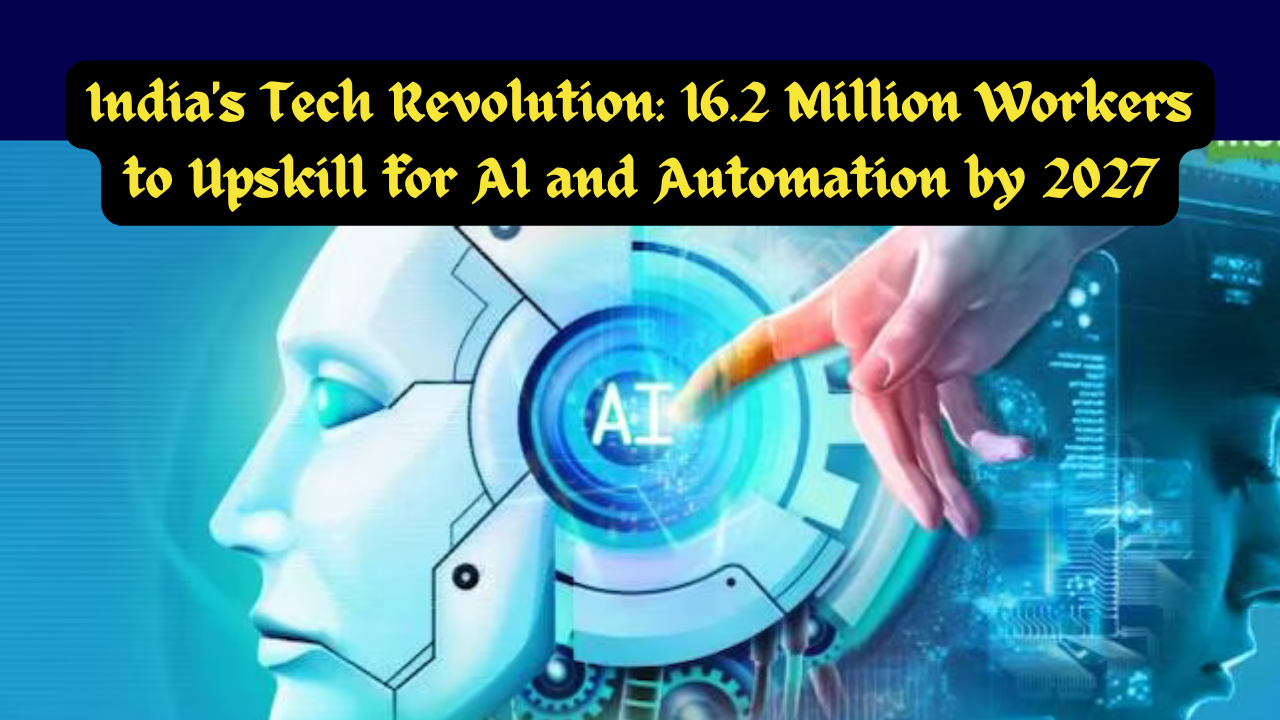India Prepares to Upskill 16.2 Million Workers as AI and Automation Rise
In the fast-evolving landscape of technology, India stands at the forefront of a remarkable transformation. With the rapid adoption of Artificial Intelligence (AI) and automation by enterprises, the country is on the verge of an unprecedented revolution that demands a significant shift in its workforce. As India embraces AI and automation, a staggering 16.2 million workers are required to reskill and upskill by 2027. This transformation not only signifies a substantial economic opportunity but also presents unique challenges and prospects for the nation.
In this article, we delve into the profound changes that are sweeping India's employment landscape. We explore the crucial role of technology in this evolution and the impact it will have on the workforce. Bengaluru, India's tech hub, takes center stage, showcasing the high demand for tech talent, especially in areas like Generation AI and automation.
Furthermore, we examine the specific job roles that will be in high demand in the near future, shedding light on the requirements of the tech industry. It's not just the tech sector that's affected; even non-tech professionals can find their skills in demand as they transition into the tech industry.
This seismic shift in the Indian job market offers a glimpse into the country's future, where technology-driven roles and opportunities take center stage. It underscores the importance of equipping the workforce with the right skills to thrive in the digital age.
India is on the cusp of an AI and automation revolution, demanding 16.2 million Indian workers to upskill by 2027. A recent report by software firm ServiceNow, in partnership with Pearson, estimates that India will create approximately 4.7 million new tech jobs by 2027 due to the massive adoption of Artificial Intelligence (AI) and automation by enterprises.
The report emphasizes that India has a unique opportunity to uplift and reskill its workforce, which could significantly impact economic growth. Kamolika Gupta Peres, Vice President and Managing Director of ServiceNow Indian Subcontinent, sees the report as a valuable input for both government and private sector actions.
Bengaluru, India's tech hub, stands at the forefront of this surge in demand for tech talent, particularly in fields like Generation AI and automation.
In response to the emerging demand for tech talent, the report highlights the need for various roles in the industry. India will need approximately 75,000 application developers, 70,000 data analysts, 65,000 platform owners, and nearly 55,000 implementation engineers within the next five years.
The report also anticipates a surge in demand for mid-level professionals across various sectors, making these roles highly sought-after in India's evolving job market.
Manufacturing is expected to have the largest share of the upskilling effort, with over 3.74 million workers requiring reskilling in AI and automation roles within the sector. Agriculture, Forestry, and Fishing will follow closely, with a need to upskill and train around 3.65 million workers.
Interestingly, the report emphasizes that even non-tech professionals can be reskilled to enter the tech industry, citing the example of deep-sea fishery workers who possess skills transferable to helpdesk support roles in the tech sector.
Overall, India's AI and automation drive is poised to reshape the workforce, necessitating an influx of reskilled workers and providing new opportunities across a range of industries. India's tech hubs are well-positioned to gain a competitive edge in this transformative era.
The report underscores the importance of building strong digital foundations to equip the workforce with the skills needed for a technology-driven future.
FAQ: "India's Tech Revolution: 16.2 Million Workers to Upskill for AI and Automation by 2027"
Q1: What is the key driver behind the need for upskilling in India's workforce?
The rapid adoption of Artificial Intelligence (AI) and automation by enterprises is the primary driver behind the need for upskilling in India. These technologies are reshaping the job landscape, creating new opportunities while rendering some traditional roles obsolete. To stay relevant and competitive, the workforce needs to acquire new skills and adapt to the changing demands of the job market.
Q2: What is the role of AI and automation in India's tech hub, Bengaluru?
Bengaluru is at the forefront of the demand for tech talent, particularly in areas like Generation AI and automation. The city is witnessing a surge in job opportunities related to these technologies, making it a hotspot for professionals seeking a career in tech.
Q3: Which sectors in India are most affected by the need for upskilling in AI and automation?
The manufacturing sector and Agriculture, Forestry, and Fishing are among the sectors most affected by the need for upskilling in AI and automation. These industries require millions of workers to reskill and adapt to the changing technological landscape.
Q4: How can non-tech professionals transition into the tech industry in India?
Even non-tech professionals can transition into the tech industry by leveraging their existing skills and abilities. Many qualities possessed by non-technical workers can be applied to high-quality, more technical roles. Reskilling and learning new technology-related skills can open doors to employment in the tech sector.
Q5: What are the expectations for India's tech hubs in the future?
India's tech hubs, such as Karnataka, Tamil Nadu, and Telangana, are expected to gain a significant competitive advantage. They have a considerable concentration of computer programmers who can adapt to the changing demands of the digital age and emerging technologies.
Q6: How can businesses in India prepare for the digital economy and the need for upskilling?
Businesses in India can prepare for the digital economy by focusing on delivering clear value through technology. They should invest in building strong digital foundations and provide training and resources for their workforce to acquire the skills needed for the future.
Q7: What are the potential career opportunities in the AI and automation field in India?
Career opportunities in AI and automation in India are vast and diverse. Roles like application developers, data analysts, platform owners, and implementation engineers are in high demand. Additionally, traditional technology roles, like computer programmers, have the opportunity to reskill for roles related to generative AI capabilities.
Q8: How is the government and the private sector addressing the upskilling challenge in India?
Both the government and the private sector are taking steps to address the upskilling challenge in India. Initiatives and campaigns have been launched to help individuals acquire the necessary skills to thrive in the tech-driven job market. These efforts aim to uplift and reskill the workforce, fostering inclusive development in the country.
Written by: Md Muktar Hossain
























